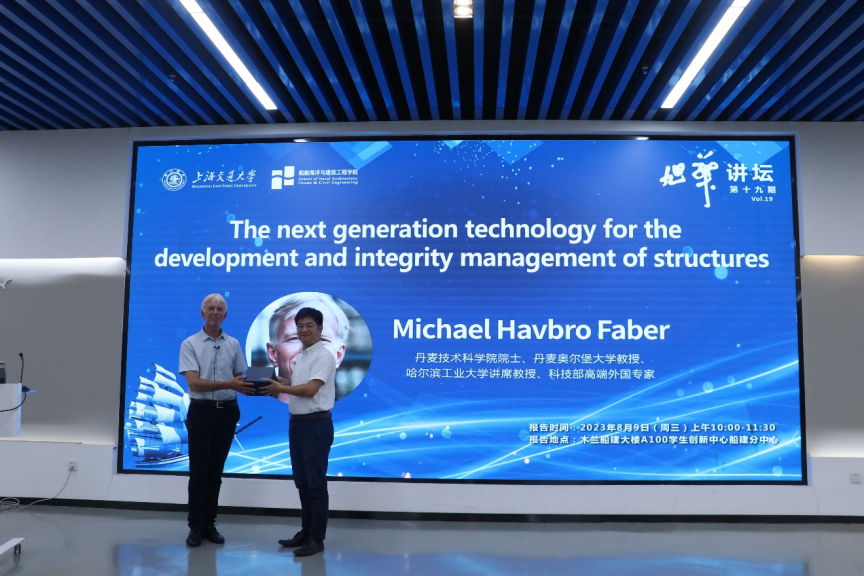Prof. Michael Havbro Faber delivered the lecutre titled "The Next Generation Technology for the Development and Integrity Management of Structures" on the 19th "Xuhua Talk"
Date:2023-08-22 Reading: 549
Professor Michael Havbro Faber, one member of the Danish Academy of Technical Sciences (ATV) and a full professor at Aalborg University, graced the 19th "Xuhua Talk" of the School of Naval Architecture, Ocean & Civil Engineering. On the morning of August 9th, he delivered a captivating talk under the title " The next generation technology for the development and integrity management of structures". The event was graciously hosted by Professor Jin-Jian Chen, Vice Dean of the school, as well as the head of the Department of Civil Engineering. Professor Faber's insightful lecture drew a vibrant audience, composed of both esteemed faculty members and eager students, all eager to engage and learn from his expertise.

Michael Havbro Faber is a professor at the Department of the Built Environment at Aalborg University, Denmark, leader of structural risks and safety at the Danish Hydrocarbon Research and Technology Center (DHRTC) and Head of Danish Centre for Risk and Safety Management (RISK). From 2011-2015 he was head of the Department of Civil Engineering at DTU, Denmark and from 2000-2011, tenured professor at ETH, Zurich, Switzerland. His research interests are directed on applied decision theory in engineering. Application areas include offshore, civil, naval and aeronautical engineering, global risks as well as management of natural hazards. His industrial experience mostly originates from COWI, Denmark, Det Norske Veritas, Norway, Matrisk GmbH, Switzerland and North Consulting, Denmark. He has taken leadership in several international committees, including the Joint Committee on Structural Safety (JCSS), Joint Committee on the GLOBE Consensus (JCGC) and the WEF; Global Expert Network on Risk and Resilience. He is a Research Fellow of the Global Risk Forum in Davos, a member of the Danish Council of Independent Research and is member of the Danish Academy of Technical Sciences (ATV). In 2019, he received the C. Allin Cornell Award for his academic contributions to the fields of safety, resilience and sustainability in pursuit of enhancing societal decision making.

Professor Faber commenced his lecture by delving into the pivotal role of the built environment within society. He underscored that the global demand for infrastructure is on the ascent in tandem with the burgeoning world population. Nonetheless, this infrastructure expansion is intrinsically linked to the escalation of greenhouse gas emissions, particularly carbon dioxide. Consequently, the contemporary challenge resides in forging the built environment's expansion while concomitantly mitigating the emission of greenhouse gases, notably carbon dioxide. In tackling this challenge, Professor Faber, alongside his accomplished research team, shared their vantage point hailing from an optimization design perspective. This encompassed formulating design goals and constraints within a comprehensive framework that interlaces risk assessment, resilience enhancement, and sustainability considerations. Of particular note was Professor Faber's emphasis on the evolution of risk paradigms. While conventional risk models predominantly revolve around loss assessments, novel frameworks necessitate a holistic evaluation of both consequences and benefits from different perspectives during the whole service life. In this vein, Professor Faber dissected broader aspects of trade-offs integral to the development of infrastructure systems. These encompassed nuanced facets like varying safety thresholds in architectural design, the calculus of maintenance expenditures, and the overarching influence of investments on carbon emissions. As his lecture culminated, Professor Faber delineated his forward-looking vision for the forthcoming era of next-generation technologies. He advocated for an expanded purview in civil engineering, transcending the conventional tenets of safety, reliability, and risk, to encompass the pivotal dimensions of resilience and sustainability. Further accentuating this trajectory, he underscored the imperative of infusing emerging technologies like artificial intelligence into the design and integrity management, fostering a sophisticated synergy that optimizes the various activities.

In the subsequent Q&A session, the audience, including the faculty members and students, expressed their sincere appreciation for Professor Faber's enlightening lecture. Eager to further delve into the subject matter, they posed a series of pertinent questions. These inquiries encompassed the establishment of models for adaptation to the extreme events and the intricate task of quantifying the environmental repercussions of infrastructure systems on marine ecosystems. In response, Professor Faber generously shared his expert insights and perspectives on these thought-provoking queries, offering a window into his own viewpoints and strategies.

Concluding the 19th "Xuhua Talk", Professor Jin-Jian Chen extended a gesture of gratitude to Professor Faber. As a token of appreciation for his illuminating lecture, Professor Chen presented him with the gift of the "Xuhua Talk" on behalf of the School.




